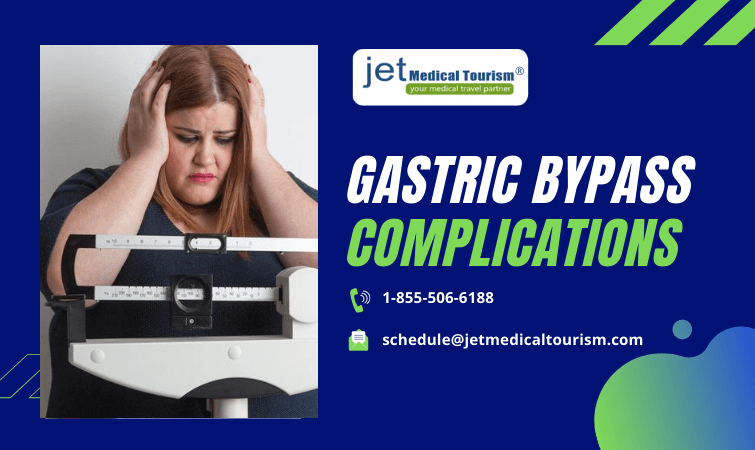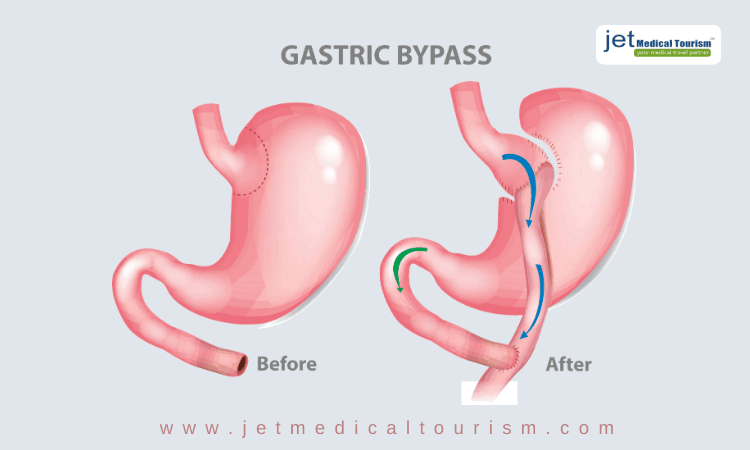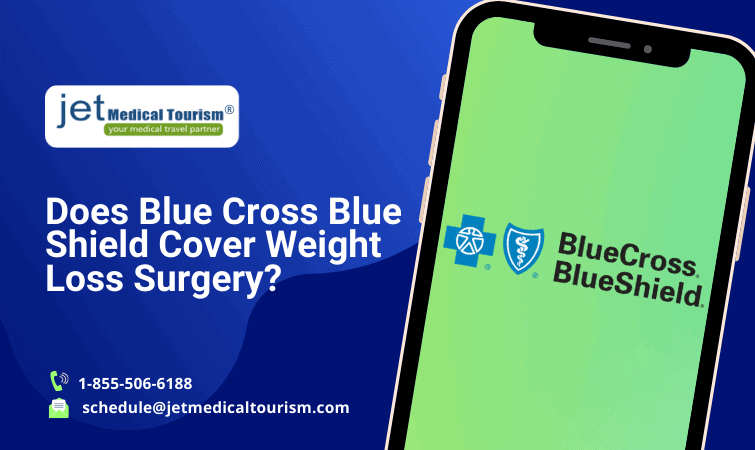Gastric Bypass Complications

Gastric bypass complications are rare, but it is important to be aware of the potential risks in order to make an informed choice. Some of the gastric bypass surgery complications may occur during or quickly after the surgery. These issues can be minimized if you choose a highly skilled and qualified bariatric surgeon who can perform the procedure with precision. They will also determine your candidacy carefully so that surgical risks are minimal.
Gastric bypass complications long term may occur usually in cases where the patient has not followed the prescribed dietary guidelines. The key is to remain committed and diligent about your diet and fitness exercises and maintain healthy lifestyle. Otherwise gastric bypass complications years later may also trouble you. In general, the health benefits significantly outweigh the risks of gastric bypass surgery.
An experienced weight loss surgeon can minimize your Roux en y gastric bypass complications. To learn more, call Jet Medical Tourism® today.
Complications after gastric bypass
It is important to understand that some risk of complications is inherent to every surgical procedure, including gastric bypass surgery. For this reason, the medical protocol all over the world requires the signing of consent forms before a surgery is performed. Complications after gastric bypass may typically include infection in the incision sites, dumping syndrome, inadequate weight loss or weight regain, and loose skin.
Post-Surgical Infection
Your surgeon will cover the incision areas with bandages after your gastric bypass surgery. You should take care to follow their instructions for incision care, and protect the wound from contamination.
Dumping Syndrome
One of the common gastric bypass post op complication is dumping syndrome. Symptoms include nausea, sweating, diarrhea, and abdominal pain. This may occur if violate the recommended dietary guidelines.
RELATED POST: Dumping syndrome after gastric sleeve
Unsatisfactory Weight Loss
Some patients may fail to lose the desired amount of weight, while some others may quickly regain weight after losing it. Reorganization of your dietary plan may help, but in some cases a gastric bypass revision surgery may be required.
CHECK THIS OUT: All you need to know about revision weight loss surgery
Excessive Loose Skin
One of the potential complications after gastric bypass is the occurrence of heavily sagging skin in certain areas of the body. Substantial weight loss may cause this problem, which can be corrected with a skin removal plastic surgery.
Early complications of gastric bypass surgery

Although major complications are uncommon after Roux-en-Y gastric bypass surgery, there are risks. Complications that can occur early on after gastric bypass include the following:z
Stomach Leak
The most serious complication of Roux-enY gastric bypass surgery is leakage along the staple-line. Leaks are rare and usually appear within in the first 10 days of surgery.
Stomach leaks may be related to a surgical technique (incorrect staple line seal) or a patient who does not comply with postoperative surgery instructions. For example, patients who prematurely swallow food or fluids in the “early recovery” period.
Studies show that about 10% of patients who undergo gastric bypass have stomach leak complications. Discuss this issue with your surgeon.
Bowel Obstruction
In some cases, bowel obstruction (blockage) may result from scar tissue or inflammation. This can cause stricture, or narrowing of the new connection between the stomach and intestine. Research shows that strictures normally develop 4 to 6 weeks after gastric bypass, and affect less than 5% of bariatric surgery patients.
Bleeding
Gastrointestinal bleeding after gastric bypass, though rare, is a potential complication that normally occurs several months after surgery. Because most bleeding is from areas along the staple-line, it is important for the surgeon to select the right staple size/height. The risk of bleeding after laparoscopic Roux-en-Y gastric bypass is reported to range from 1.1% to 4%.
Blood Clots
A blood clot (pulmonary embolism) is the most common early complication of gastric bypass. This happens when a clot travels from your leg veins upward to your lungs; blocking air from going in and out. Symptoms may include chest pain, coughing, rapid breathing/heart rate and shortness of breath. You can prevent a blood clot by walking, walking and more walking!
Infections
After surgery, you will have multiple small incisions on your stomach and in your belly button. You should clean your incision sites, especially your belly button with hydrogen peroxide or Alcohol pads at least once a day to prevent complications from infection. Call your surgeon if you experience excessive swelling, redness or yellow or tan discharge from the incision site or a fever > 101.0.
Other risks and complications may exist depending on your medical condition. Patients should carefully consider all of the risks and benefits before having gastric bypass surgery.
SEE THIS ALSO: Gastric bypass pros and cons
Gastric bypass complications long term
Long-term complications after gastric bypass can include, but are not limited to:
Vitamin and Mineral Deficiencies
About 30 percent of patients who have gastric bypass develop nutritional deficiencies (e.g., osteoporosis, anemia and metabolic bone issues). Because gastric bypass surgery changes the anatomy of the digestive system, both digestion and absorption of nutrition from food is altered.
- First, the digestion of food is altered due to the “stomach” being bypassed. This means that food will no longer come in direct contact with gastric acid or pepsinogen.Gastric acid is required for vitamin B12 absorption. Pepsinogen helps break down dietary protein so the body can absorb it. A gastric bypass causes your body to absorb lower levels of both B12 and protein.
- Second, absorption is altered because the part of your “small intestine” responsible for absorbing other vitamins and minerals is now bypassed. This means that your small intestine is absorbing less calcium, iron, zinc, copper and several B-vitamins from the food you eat. These nutritional deficiencies can be avoided by taking bariatric vitamin and mineral supplements.
Malnutrition
Malnutrition is a health condition caused by a lack of micro-nutrients (vitamins and minerals) or macro-nutrients (calories from protein, fat and carbohydrates). There are several types of malnutrition.The most basic type is called protein energy malnutrition. It results from a diet that lacks energy and protein due to a decrease in all major macro-nutrients.
Other types of malnutrition result from vitamin and mineral deficiencies (micro-nutrients). Gastric bypass patients may develop malnutrition because they take in too few nutrients or their body is unable to process the nutrients that they do take in. Signs of malnutrition complications after gastric bypass surgery varies but normally includes fatigue, dry skin, weakness and dull or brittle hair.
Strictures
Stomal stenosis is a possible complication related to gastric bypass. This happens when there is a stricture (tightening) of the opening between the stomach and intestine. The most common symptoms include vomiting and difficulty swallowing. Most doctors believe excess scar formation and frequent vomiting cause stomal stenosis.
Ulcers
Ulcer formation after gastric bypass occurs in about 2% to 4% of weight loss surgery patients. Symptoms may include abdominal pain, nausea, vomiting of blood or black stool (occurs weeks after surgery). You can prevent ulcers by not smoking, avoid anti-inflammatory drugs and aspirin and take prescribed acid-reducing medication.
Hernias
A hernia is any abnormal opening in the stomach wall. Internal hernias due to Roux-en-Y gastric bypass surgery are more common after “laparoscopic” gastric bypass than after “open” surgery. This results if the abdominal wall gets damaged during surgery and causes a weakness in the stomach lining. Incisional hernias occur when an incision does not heal properly, allowing the abdominal muscles to separate.
Gastric bypass complications years later
In exceptional situations, gastric bypass complications years later may occur. This will depend on how diligently you have followed a balanced diet and an active lifestyle over the years. Your underlying medical conditions may also contribute to gastric bypass years later complications. Some of these potential concerns include:
Ulcers
Ulcers may develop not only in the short run after a gastric bypass, but also years later. Significant problems may occur because the ulcers, such as internal bleeding, perforation in the organs, or infection. Smoking is one of the contributing factors in the long run for this complication among patients who have undergone this surgery.
Hiatus Hernia
Some patients suffering from obesity may already have hiatus hernia, in which a portion of the stomach moved through the diaphragm to the chest. Suturing of the hiatus during gastric bypass surgery can correct this problem. However, it may occur once again in the long run, if you regain weight. Symptoms may include acid reflux and heartburn.
Nutrient Deficiencies
Laparoscopic gastric bypass complications years later may include deficiencies of essential vitamins and minerals in the body. The surgery is malabsorptive and will alter the regular gut anatomy to some extent. Therefore, nutrient deficiencies may develop in some cases over times. You can minimize this risk by taking your daily dose of nutrition supplements as directed.
RELATED: What is gastric bypass surgery
Gastric bypass complications feeding tube
One of the short-term risks of gastric bypass is stomach leak, which may occur within a few days after the surgery. This complication is extremely rare, but if it is left untreated, it can cause serious issues such as the development of an abscess within the abdomen. Treatment involves closure of the leak, and insertion of a feeding tube directly into the bowel.
Gastric bypass complications feeding tube may occur in a few patients, whether the procedure is performed laparoscopically or using an open surgery. Intestinal perforation is one of the major fallouts that your surgeon will watch out for after gastric bypass complications feeding tube. In general, you can avoid these risks by choosing a well-qualified bariatric surgeon for your procedure.
Pregnancy complications after gastric bypass

Maternal nutrition is one of the key concerns for a pregnancy after gastric bypass surgery. If you plan to become pregnant after this procedure, you will need to watch out against nutritional deficiencies. Iron deficiency and anemia are common pregnancy complications after gastric bypass. In rare circumstances, adverse outcomes for the mother or the baby may occur due to these deficiencies.
Researchers have suggested in recent years that micro-nutrient and protein deficiencies, such as calcium, iron, folic acid, albumin, and ferritin deficiency may occur among pregnant women. However, in general, pregnancy risks are not significantly altered after weight loss surgery. Talk to your surgeon about pregnancy complications after gastric bypass if you are planning to have a baby.
RELATED READ: Pregnancy after bariatric surgery: Is it healthy and safe?
Gastric bypass post op complications
Many patients wonder whether a bariatric surgery is worth it because of the potential risks involved. In reality, the health risks associated with obesity are far in excess of the potential gastric bypass surgery complications. Untreated obesity contributes to many life threatening diseases, such as type 2 diabetes, heart disease, hypertension, obstructive sleep apnea, and fatty liver disease.
In comparison, the risk of gastric bypass post op complications is much lower. Your health, longevity and quality of life can dramatically improve with a weight loss surgery. As long as you work with a trusted bariatric surgeon with a proven track record, your gastric bypass post op complications will be minimized. Most importantly, you should stay committed to following the surgeon’s dietary guidelines for safe outcomes.
YOU MIGHT ALSO LIKE: Gastric bypass post op diet
Lap band after gastric bypass complications
Some patients may go through a gastric bypass revision that includes the surgical insertion of a lap band. The goal is to further reduce the stomach’s capacity for food intake. However, lap band after gastric bypass complications may arise in a few cases. If the leakage of stomach fluids into abdomen takes place, the lap band may have to be removed.
Band slippage, saline leaks, and expansion of the stomach pouch are some other lap band after gastric bypass complications. Some of the complications may even occur after several years. In rare cases, the lap band may cause tissue inflammation or esophagus tissue dilation. However, lap band removal is an effective solution to most of these concerns.
CHECK THIS OUT: Lap Band Revision Surgery in Mexico
Gastric bypass liver complications
In general, patients who are suffering from obesity-related fatty liver can significantly benefit from a gastric bypass surgery. However, according to researchers, liver dysfunction may occur in rare cases after this procedure. An increase in the number of liver enzymes and impairment of coagulation parameters are indicators of liver dysfunction in these cases.
Gastric bypass liver complications may occur because of distal versions of Roux en y bypass or due to the extension of excluded limbs. However, the exact underlying causes for liver deterioration following gastric bypass are not yet clearly understood. Alcohol abuse has been associated with gastric bypass liver complications in some cases.
Gastric bypass ulcer complications
In gastric bypass surgery, the size of the stomach pouch is reduced using surgical staples. Irritation may occur in the staple lines that have been left behind, which can lead to ulcers over time. Stomach bacterial infections in gastric bypass patients may also increase the risks of ulcers. Gastric bypass ulcer complications may be diagnosed if you experience vomiting, nausea, abdominal pain, or blood in stool or vomit.
To reduce your risks, you should minimize the use of NSAIDs, which can sometimes cause stomach irritation and increase the likelihood of ulcers. Avoid alcoholic and caffeinated beverages as far as possible so that your stomach lining does not get inflamed. These simple measures will keep you away from gastric bypass ulcer complications in most cases.
YOU MIGHT WANT TO READ: Ulcers after gastric sleeve surgery
Risks of gastric bypass surgery
If you’re considering Roux-en-Y gastric bypass surgery, we encourage you to discuss the benefits and risks with your surgeon.
Risks related to metabolic and bariatric surgery include:
|
|
Risks and complications after gastric bypass surgery include:
|
|
What percentage of gastric bypass patients have complications
Before you go ahead with your bariatric surgery, it may help to know what percentage of patients have gastric bypass complications. One Stanford University research study showed that serious complication rate in the first 30 days after gastric bypass surgery was as low as 1.25 percent.
What percent of gastric bypass patients gain the weight back
During your pre-op consultation, you should ask your surgeon what percent of gastric bypass patients gain the weight back. According to Obesity New Today, over 85 percent of the patients will lose and maintain minimum 50 percent of their weight loss. In other words, less than 15 percent of the patients may regain weight after a gastric bypass.
Can gastric bypass cause Crohn’s disease
Researchers have identified three cases in the US where the patients developed Crohn’s disease after a gastric bypass surgery. While the risk appears negligible, it is prudent to ask your bariatric surgeon can gastric bypass cause Crohn’s disease. Researchers have no clear evidence yet, but they speculate that bacterial environment after this surgery in genetically predisposed patients may lead to this problem.
It is vital to note that only patients who already have a genetic predisposition for Crohn’s disease may be at the risk of developing this condition after a gastric bypass. The surgery may trigger chronic inflammation of the intestine in these patients.
The question: “Can gastric bypass cause Crohn’s disease” has no clear answer, but if you are diagnosed with this illness, you may avoid gastric bypass surgery.
Tips to avoid gastric bypass surgery complications
The golden rule to avoid Roux en y gastric bypass complications is to select a top qualified and experienced weight loss surgeon for your procedure. However, even if your surgery is completely successful, it does not give you the freedom to ignore your surgeon’s dietary guidelines and other post-op care instructions.
Here are a few useful tips to avoid gastric bypass surgery complications:
• Post-op Diet: Follow the liquid and pureed diet in the first few weeks as directed by your surgeon and their nutrition team. Eat small portions, chew your food thoroughly, and stay well hydrated throughout your post-surgical weight loss journey.
READ FULL POST: Gastric bypass post op diet
• Drug Management: Gastric bypass is a malabsorptive surgery. This means the absorption rates of your orally administered prescription drugs may also be affected. Follow up with your physician for medication adjustments and continue periodic medical check-ups.
• Nutrition Supplementation: Be prepared to take your daily dose of nutrition supplements without fail for the rest of your life. This will help minimize your long term risk of gastric bypass surgery complications. Supplements may include multi-vitamins, iron, and other micro-nutrients.
• Lifestyle Changes: Minimize your intake of alcoholic, caffeinated, carbonated, and sugary beverages. Stay away from the habit of snacking and “grazing.” Maintain a regular exercise and fitness regimen, and work consciously to strengthen your mental and emotional well-being.
Minimize the risk of gastric bypass complications with Jet Medical Tourism®
Jet Medical Tourism® is one of the leaders in the field of bariatric surgery in Mexico. We have teamed up with some of the most qualified and experienced weight loss surgeons with proven expertise in gastric bypass and other bariatric surgeries.
We work with reputable Mexico hospitals and bariatric surgery clinics, which are equipped to treat patients from the US and Canada. We can ensure that your risk of gastric bypass complications is minimized, and your safety is our highest priority. Call us today to schedule a free consultation with one of our surgeons.
Other useful resources on gastric bypass
- How gastric bypass impacts hunger hormones
- Gastric bypass requirements: Am I a good candidate for it?
- Gastric bypass diet: Pre-op & post-op diet guide
- Gastric bypass recovery time
- Gastric bypass revision success rate
- how much does gastric bypass cost?
- Gastric bypass before and after pictures
- Gastric bypass surgery alternatives: Gastric bypass revision
- Gastric bypass cures diabetes: Fact or myth?
- how much does gastric bypass revision cost?
- Gastric bypass post op diet






